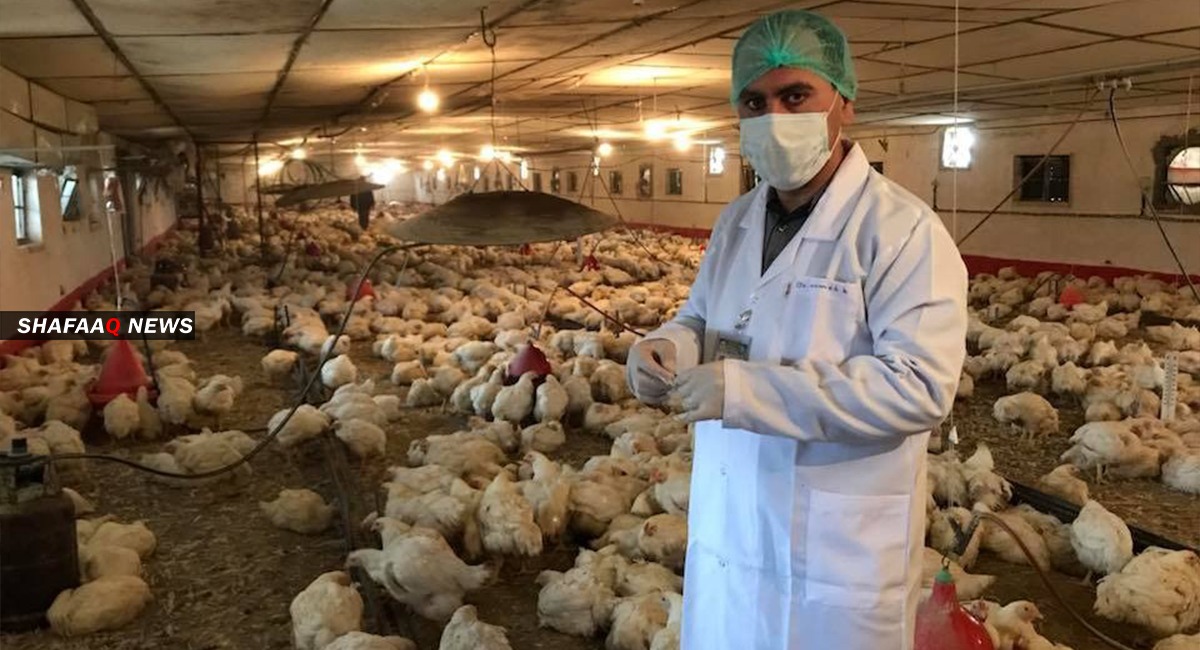After the import ban, what sets the prices of poultry products on fire?

Shafaq News/ Specialists and officials attributed the surge of poultry product prices in Diyala and other Iraqi governorates to high feed prices, soaring dollar exchange rates, and lack of veterinary support for poultry breeders, while other specialists criticized the decisions of the Ministry of Agriculture.
"Although imported poultry products have been banned, feed prices have risen by 40%, along with higher prices for vaccines and veterinary drugs due to the high exchange rate of the dollar," Mohammed Hussein al-Jadri, owner of chicken fields, told Shafaq News agency.
He continued, "the price per ton of feed soy has risen from 580,000 to 950,000 dinars, maize prices from 380,000 to 600,000 dinars, as well as protein from 110 dollars to 1,300 dollars per ton."
Al-Jadri confirmed the lack of veterinary support for poultry farms, "all the medicines and veterinary drugs are imported. Their prices increased due to the impact of the dollar markets and the poor agricultural support for breeders, which is limited distributing some maize annually. However, two years ago, small and medium projects were skipped, and only large projects were included in the distribution."
"Veterinary vaccines for influenza (H5) have been smuggled for four years for the officials do not allow them into Iraq despite the ongoing flu outbreak since 2016," he added.
Diyala's director of agriculture, Mohammed al-Mandalawi, attributed the rise in poultry products to, "the high prices of imported feed due to dollar the exchange rates and the abundance of unlicensed poultry farms that drags all the feed from local markets have elicited a significant surge in poultry product prices."
Al-Mandalawi said that the Directorate of Agriculture subsidizes licensed poultry farms with maize. He added that the power outages and the high fuel cost catalyze the rise of poultry products prices in Diyala.
Veterinary expert Dawood al-Saadi said, "the current 6,500 dinars price of a dozen of eggs is a 'major crime' in the summer, alongside the high price of chicken. It harmed the middle and low-income people."
Al-Saadi blamed the Ministry of Agriculture and its ill-considered decisions, "the prices of poultry products are chaotic, and those affected by the import ban are not taken into account."
"Balancing production and consumption must be considered before making any vital decisions that directly impact the average citizen," he added.
Al-Saadi also blamed economic security and security agencies for "the chaos and manipulation of the poultry product prices despite the Ministry of Agriculture's decree to set the price the dozen of eggs at no more than 5,000 dinars, which is relatively high compared to the number of poultry farms and fields in Diyala."
He also confirmed, "The veterinary services do not subsidize poultry farms with vaccines or drugs and limit their work to granting veterinary health certificates to facilitate the marketing and transportation of egg and other products inside and outside the governorate."
Al-Saadi called for "supporting the poultry and fish sector with medicines, veterinary drugs, and vaccines, similar to the continuously free subsidy provided to livestock throughout the year."
A spokesperson for the Ministry of Agriculture stated that opening up the market for imported eggs will lead to the collapse of the poultry sector in Iraq and attributed the high prices of domestic eggs to monopoly and lack of government control.
The ministry's spokesperson, Hamid al-Nayef, told Shafaq News agency, "the rising exchange rate of the U.S. dollar shuttled the prices of feed, soybeans, and other materials used in growing chicken and producing eggs."
"the ministry agreed with poultry producers to keep the price of a package of eggs at no more than 5,000 dinars," he added.
"The missing link between the agreed-upon price (5,000 dinars) and the actual market price (7,000 dinars) is the weakness of the government control on the market that prevents traders from monopoly."
"Importing eggs will result in a complete collapse of the poultry sector. What we have built-in three years to develop and support this sector will collapse," he continued, "it will force poultry growers to sell their farms, lay off millions of workers, and move their farms to neighboring countries, which means going back to square number one: Importing eggs."
The market prices of eggs and poultry products soared drastically, with the price of a single package of eggs jumping to 7,000 dinars, 2,000 or 3,000 dinars up the original price.





